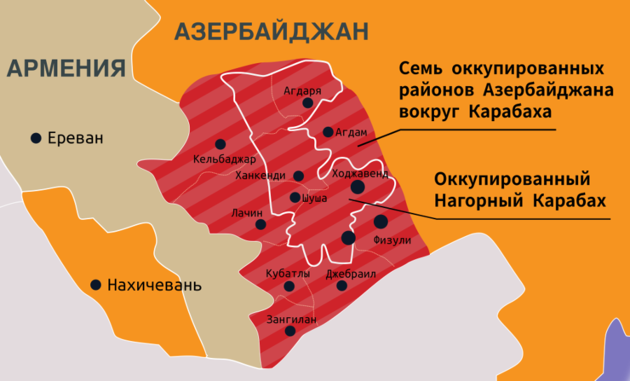Speaking at the meeting of the parliamentary commission on foreign relations a week ago, Armenian Foreign Minister Zohrab Mnatsakanyan announced the possibility of a phased solution to the Karabakh conflict, stressing that it does not matter to the Armenian side whether the solution to the problem will be phased or package. The foreign minister noted that several conditions must be complied with that would help maintain the balance of the parties in the resolution of the conflict. What kind of balance he talked about remains unknown.
Armenian diplomacy's position is conservative regarding a phased resolution of the conflict: the occupied regions are defined as territories that perform the defensive function as the so-called security belt. Armenia’s military participation in the conflict is argued as ensuring the security of the Armenian population of Karabakh. The determining condition for a settlement for Armenia remains the issue of the Karabakh status - its territorial affiliation. This approach has not changed for over the past quarter of a century. The humanitarian issues are considered secondary, and Yerevan has no interest in issues of Azerbaijani statehood.
The goal of any phased settlement is pragmatic - gradually creating fundamentally new conditions that will subsequently help overcome the most complex contradictions by minimizing the contradictions. However, the Armenian position does not allow any progress, and therefore is destructive. This is indirectly confirmed by the Armenian Foreign Minister, when he says that Yerevan allows a phased solution to the conflict, but does not consider it necessary to discuss economic cooperation, the ethnic map of the region or the Armenian military presence.
Conditions change solely under the influence of internal factors caused by the unresolved conflict. As a result of the Karabakh blockade, its own political and business "elite" was formed, which monopolizes almost all spheres in the region. This affects Yerevan's position and the entire negotiation process, as the Armenian authorities work closely with the self-proclaimed authorities. An important destructive component has long been present in the settlement issue - the business interests of the local "elite", which does not want to leave out the monopoly on power and resources.
In terms of the Karabakh settlement, there are two realities in Armenia: everyday and diplomatic.
In everyday reality, the Karabakh crisis is a conflict between peoples in which one of the parties is experimenting with the dangerous term of "historical justice." This could be observed in February during the Munich meeting between Prime Minister of Armenia Nikol Pashinyan and President of Azerbaijan Ilham Aliyev. By substituting concepts, mythologizing and aggravating the history of contradictions, Armenian propaganda models in the public mind the image of a constant threat in the person of Azerbaijan and the image of a 'defender,' which includes Armenian diplomacy among other things. Such a vision of the problem allows to present the diplomatic shortsightedness of the Ministry of Foreign Affairs and other politicians as 'successful' defense of existing positions indefinitely. This distracts the public's attention from everyday problems, especially since the republic has still not formed an acute public request for a settlement of the Karabakh problem.
Another reality is diplomatic, in which the historical research of the Armenian side is unacceptable. Not a single international structure, not a single mediator will discuss the position of any of the parties to the conflict if it is based on 'historical predetermination'. In this reality, Armenian diplomacy cannot argue its point of view with the national propaganda, therefore, it prefers to ignore international resolutions and the results of longstanding work of mediators, since a diplomatic solution to the Karabakh problem remains disadvantageous in terms of maintaining a monopoly of power in Karabakh. That is why the annual meetings of representatives of foreign affairs agencies are often concluded without a suitable outcome. At best, the parties agree to reduce mutual criticism in the media.
For many years, Armenian propaganda defines Azerbaijani politics exclusively as hostile. Any initiative of Baku is presented as a threat of ethnic deportation, which supposedly will happen if Azerbaijan somehow 'filters' in Karabakh, including through soft power. Yerevan fails to mention that the number of people which have left Armenia and Karabakh after the ceasefire is bigger than during periods of sharp escalation.
Speaking about a phased resolution of the conflict, the Armenian side actually transforms the negotiation process into the territorial division. In other words, the Armenian side insists that Baku accepts the occupation, the geographical borders of which will be discussed by Yerevan. Given all this, the question arises of what rhetoric Yerevan expects to hear from Baku, if Armenia's ideology for many years has been based on the fact that the closest neighbor, whose position is not even considered, is demonized in almost all political areas.
For comparison, Abkhazia and Georgia were also unable to achieve significant progress in resolving the ethno-political conflict. However, Tbilisi and Sukhumi managed to maintain an understanding of the inevitability and the need to find common ground, since the confrontation will end sooner or later, and the infrastructure will need to be restored by joint forces, especially the power industry (the Inguri Hydroelectric Power Station) and transportation (railway communication).






